15 Second Summary
Activated Charcoal has been used in hospitals for decades as the ‘universal antidote’ for drug overdoses and acute poisonings, however, over the years there have been many claims that it also has other health benefits, such as removing everyday “toxins” from the body (like alcohol), relieving of gas and bloating, improving heart health, and also that it has anti-aging properties, just to name a few.
Sorry to say folks, but having analyzed the 159 published human studies of Activated Charcoal in the last 30 years, there is no credible scientific evidence to suggest that Activated Charcoal provides any of those benefits.
Activated Charcoal has been used in hospitals as a treatment for acute poisonings for years.
But today, more than 100 000 people search for "Activated Charcoal" on Google every month. At HBS, we started to worry that more people were blending it in their smoothies than using Activated Charcoal to combat an Acetaminophen overdose (more on which below).
No, Activated Charcoal is popular right now because some marketing companies (and bloggers, nutrition "experts," and other internet "authorities") have made quite bold claims about its positive effects on your health.
This article is for you if you've heard those claims, and you're wondering what the scientific evidence actually says.
Let's start from the beginning.
What claims are being made about Activated Charcoal?
There are many claims that Activated Charcoal does all of the following (are you ready?):
- Skin cleanser
- Teeth cleanser
- Relieves diarrhea, gas, bloating, and stomach cramps
- Rids bad breath and body odor
- Removes pollutants and grease from your hair
- Spider bites
- Relieves cholestasis of pregnancy (the main symptom is itchiness during pregnancy)
- Improves Heart Health
- Anti-aging properties
- Calming hyperactive children down
- What an amazing product….should I run out and buy some now?
I've included in our reference list some of the websites that make these claims (1 , 2). There is even talk about results from studies without citing any studies (a ‘pet hate’ of mine). Here are some examples of the kinds of things you hear about Activated Charcoal in the marketing material:
Activated charcoal contains many small chambers and cavities that "capture" or bind-up unwanted materials and gas and carry it safely through the digestive system. (http://www.naturesway.com)
Activated charcoal is made from peat (decomposed vegetable matter) and coconuts, which are specially treated at high temperature. When seen under a microscope, activated charcoal has many small chambers that create an extensive surface area. These chambers are able to trap the molecules of most toxic substances. (https://www.priceline.com.au)
Based on these marketing product descriptions, Activated Charcoal will get rid of ‘unwanted materials’ from my body ‘safely’ through the digestive system.
First, I would hope that the product works ‘safely’ otherwise it wouldn’t be on the market to start with, (Note: Consider the possibility that it works ‘safely’ because it actually isn’t doing anything.) And second, I would love to know what the ‘unwanted materials’ actually are, because none of these descriptions seem to tell me. Could they be toxins that my body doesn’t already dispose of ‘safely’ in order to maintain homeostasis? We'll see.
One last point on the marketing of this product, if you look at the disclaimer (e.g. the fine print) at the bottom of Nature’s Way website on Activated Charcoal (http://www.naturesway.com/Activated-Charcoal-100-Caps), it states the following “This product is not intended to diagnose, treat, cure or prevent any disease.” You'd be forgiven for ending your investigation of activated charcoal right there.
Now you know what people are saying, let's take a closer look and see what research actually says about Activated Charcoal.
What's the state of the scientific knowledge of Activated Charcoal?
Published Scientific Research
Over the past 30 years, there have been 316 published studies listed in PUBMED where the term “Activated Charcoal” appears in both the title and abstract of the journal article (Figure 1). However, only 159 are human studies – others are animal, plant, and laboratory studies. With only 159 human studies conducted over 30 years, it highlights very little research interest in Activated Charcoal (on average 5 studies per year!).
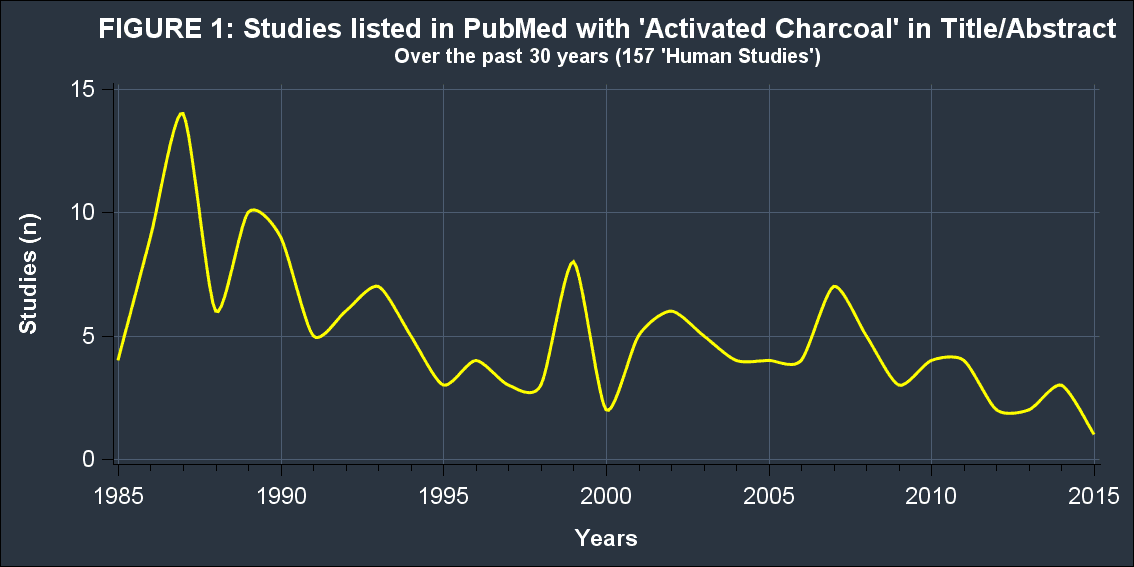
Activated Charcoal is used to clear out toxins from your body. It is commonly used in the emergency treatment of certain kinds of poisonings given its ability to prevent the absorption of most toxic agents from the gastrointestinal tract and enhance the elimination of some agents already absorbed.
Although Activated Charcoal is generally used as a ‘universal antidote’ to most toxic substances, it doesn’t prevent corrosive agents such as strong acids and petroleum products (e.g. petrol, cleaning fluid, oil, kerosene, paint thinner, etc), or alcohol from being absorbed into the body.
Hence, the majority of published studies on Activated Charcoal have focused on how well it helps to clear out the medication chemicals. Over 50 studies have been conducted on this topic and for some medications, there is a clear benefit of administering Activated Charcoal for overdoses, and for some medications, the evidence is less clear. Keep in mind though, that the number of study participants in the majority of these studies is small.
Wait there….I just want to make sure we are clear on this, we are talking about Activated Charcoal being used in a hospital/clinic setting as an antidote for potentially fatal doses of toxic substances. We (or the published research for that matter) are not talking about Activated Charcoal as an antidote to the small traces of toxins in your body that are combated daily by your body’s natural defense mechanisms.
Activated Charcoal Does Not Remove “Everyday” Toxins From Your Body
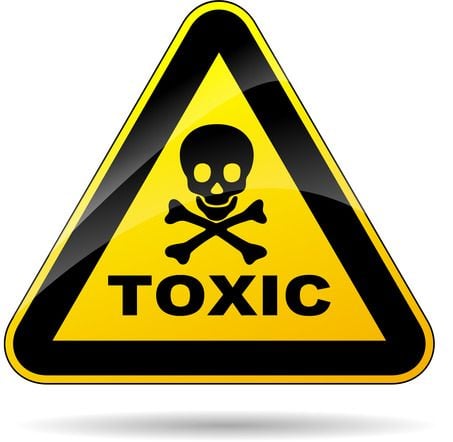
Ignore for a moment that the word “toxins” is totally overused in health marketing and rarely will a product like AC actually define what it means. Consider this...
Studies show that the effectiveness of Activated Charcoal diminishes the longer you wait to administer it after the poisoning episode occurs. It is advised to administer Activated Charcoal within one hour of the poisoning/overdose episode and if you leave it until 2 hours or so, then the absorption of toxins is reduced by over half and continues to diminish over time (3). For example, Activated Charcoal has a limited effect on absorbing acetaminophen overdose after 2 hours. (4)
If this is the case, I question how well Activated Charcoal could work at absorbing very low levels of toxins, or ‘everyday’ levels – the kind of levels we are told we must ‘de-toxify’ by using Activated Charcoal.
Why? Because if Activated Charcoal does have an effect on eliminating small traces of toxins from your body, it will most likely only be on the toxins that arrived in your body one hour or so prior to ingesting Activated Charcoal! And you can’t keep ingesting Activated Charcoal every hour or so unless you never want to defecate again (see constipation side effect).
Even further than that, Activated Charcoal does not discriminate between what it sees as ‘toxins’ versus ‘nutrients’ in the body, and that means if it does eliminate ‘toxins’ then it also eliminates ‘nutrients’. Ouch!
Activated Charcoal And Medication Overdoses
I won’t go into details of each study, but as shown in Figure 2, Activated Charcoal has been investigated to help eliminate many different medications due to overdose, and for some the results are inconclusive.
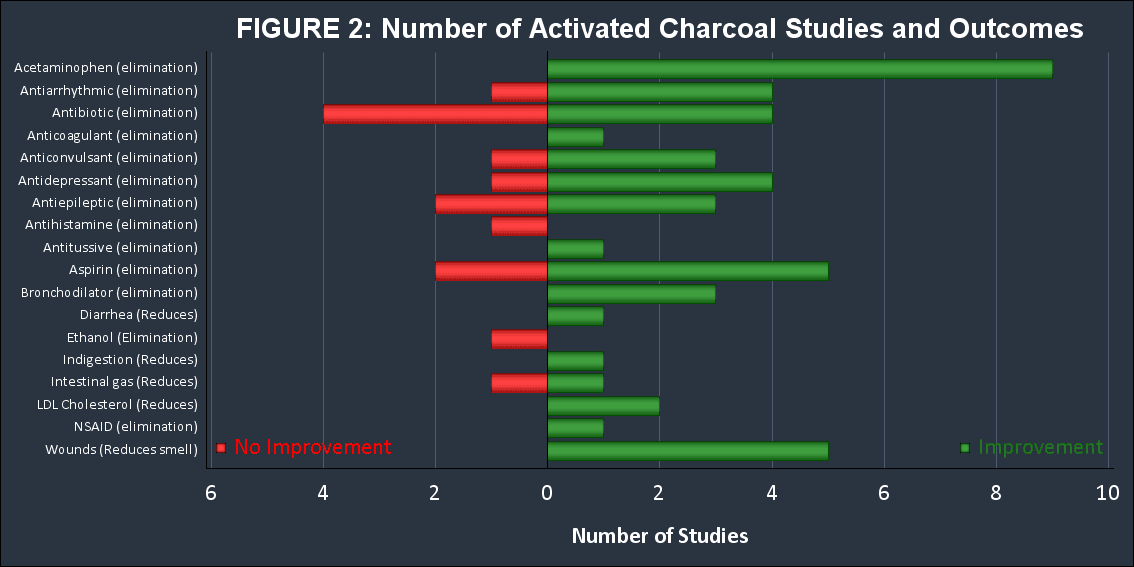
For example, when looking at Acetaminophen (a pain reliever), all nine studies suggest that Activated Charcoal significantly helps clear it from the body – meaning it has a positive finding.(5) The same could be said for:
1) Antidepressant medications (4 out of 5 studies with positive findings) (6)
2) Aspirin (5 out of 7 studies with positive findings)(7)
3) Antiarrhythmic medications (4 out of 5 studies with positive findings)(8)
4) Theophylline (e.g. bronchodilator) with all 3 studies having positive findings.(9)
Whereas the evidence is not clear for antibiotic medications (4 out of 8 studies with positive findings)(10) and Antiepileptic medications (3 out of 5 studies with positive findings)(11)
NOTE: The above graph is not a comprehensive list of studies on this topic, but it summarizes the main findings.
Bottom Line: There is evidence to suggest that Activated Charcoal is helpful in removing excess Aspirin, Antidepressant medications, Antiarrhythmic medications, and Theophylline from the body if taken within the first two hours of a poisoning or overdose incident.
Studies On Activated Charcoal And Intestinal Gas, Bloating & Digestion Issues
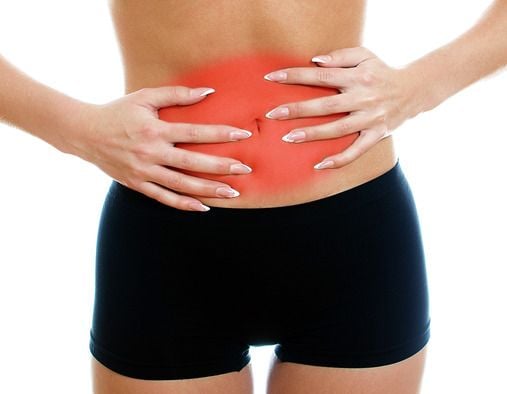
There have been claims that Activated Charcoal reduces intestinal gas and bloating. Well, the bad news is that only two studies have been conducted (both over 15 years ago) and one study said that Activated Charcoal reduces intestinal gases (12) and the other said it didn’t. (13)
A more recent study did suggest that Activated Charcoal improves indigestion (14) but this is a single study and more research is needed before anyone could say that this is a concrete benefit of using AC.
On a similar note, only one study in children said that it helped reduce diarrhea. (15)
Bottom Line: There is a lack of scientific evidence to support the claims that Activated Charcoal helps reduce intestinal gases, indigestion, and diarrhea
Studies on Activated Charcoal And Heart Health
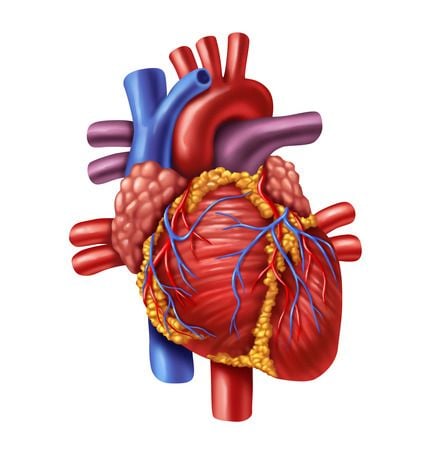
Similarly, when it comes to the ‘wonder’ claim that Activated Charcoal improves heart health, only two studies in the 1980’s examined the effect of Activated Charcoal on lowering cholesterol among patients with hypercholesterolemia (excessive cholesterol).
Results from both studies reported a ~25% reduction in LDL (bad cholesterol) associated with up to 4 weeks of Activated Charcoal treatment. (16) Keep in mind though, that one study had only 7 patients, and the other only 17 patients – which sorry to say, does not make these results generalizable to the overall population.
As a researcher, I wonder: If Activated Charcoal reduces cholesterol, then why haven’t there been any further studies on this topic over the past 25 years as a ‘wonder’ drug for lowering cholesterol? – go figure! The drug companies would have gone crazy with this idea!
Bottom Line: There is no conclusive evidence to suggest that Activated Charcoal has any effect on lowering cholesterol for members of the general population.
Studies on Activated Charcoal Reducing Body Odour
Another interesting claim is that Activated Charcoal reduces body odor. Phew!
This was difficult to make a direct link to any published research. However, the closest related studies I could find were five studies that investigated using Activated Charcoal dressings on skin wounds/ulcers to reduce malodor and toxic fluids. And yes, all five studies concluded that Activated Charcoal dressings did exactly that. (17)
As for the ‘wonder’ claims though: Body odor is caused by bacteria on the skin breaking down our sweat into acids, so how could ingestion of Activated Charcoal reduce body odor? Unless you plan on wearing Activated Charcoal dressings under your armpits (or any other private places!).
Bottom Line: There is no evidence to suggest that Activated Charcoal reduces body odor.
Some interesting reports on the adverse effects of Activated Charcoal
I think it's worth noting here some of the adverse effects of AC use that were observed during research, if for no other reason than to point out that it's not necessarily “safe”, for all people in all uses.
- A prospective 7-year study of 575 patients admitted to hospital for treatment of poisonings investigated adverse reactions of Activated Charcoal and results showed an increased risk of nausea or vomiting, and bronchoaspiration (e.g. draw in-and-out using sucking motion) associated with Activated Charcoal. (18)
- An 18-year-old intoxicated male who was administered Activated Charcoal developed acute respiratory distress. (19) A case-Report.
- A 38-year-old male reported pulmonary lesions (lung disease) 35 years after accidental aspiration of Activated Charcoal. (20) A case-Report.
- A study of 275 children treated with Activated Charcoal for acute poisoning in an emergency department found that one of every 5 children vomited within 10 minutes of having Activated Charcoal. (21)
- A 2-year-old girl presented acute mental alteration secondary to presumed poisoning. She was given Activated Charcoal and as a result, had an episode of vomiting during the respiratory weaning and developed obstructive laryngitis. (22) A case-Report.
- A 42-year-old woman who had ingested a large amount of fenitrothion emulsion was admitted and treated with activated charcoal via a nasogastric tube. She developed massive rectal bleeding just after she had passed several hard masses of charcoal on the 10th day. Surgical hemostasis of the rectal ulcer was needed to control the hemorrhage. (23) A case-Report.
Is Activated Charcoal Safe?
Despite the handful of case reports presented above, in general, Activated Charcoal is safe when used in the short term. However, it is important to note that there has been no research investigating the health effects of long-term use of Activated Charcoal – and this means both positive and negative health effects (I am not taking sides here, I am just stating the bare facts).
Some of the reported side effects of Activated Charcoal include constipation and very black stools (e.g. poo), which makes logical sense (yuck!), and it should not be used if you have any gastrointestinal blockages, or digestion problems, because Activated Charcoal will only make it worse since it causes constipation due to its absorption properties.
I can’t say this loudly enough, it is extremely important to know that you should NEVER take Activated Charcoal with other medications administered orally (e.g. via the mouth) – think about it, as Activated Charcoal absorbs substances in the stomach and intestines it will also absorb the chemicals in the medication and therefore decrease the effectiveness of the medication.
Ongoing Research Into Activated Charcoal?

Let’s face it, the likelihood of any clinical studies being conducted on Activated Charcoal to assess its ‘wonder’ health claims is slim because 1) the product is reasonably safe and therefore doesn’t warrant epidemiological studies on its safety, and 2) why should drug/health companies conduct research. The product sells well without having to ‘prove’ (or reject a null hypothesis) the ‘wonder’ health claims.
Therefore, the bulk of research has been and will continue to be, on the efficacy and methods of administering Activated Charcoal in a clinical setting as an antidote to severe poisonings. If any, there will be limited quality research on the positive health claims that drive the high-end sales of Activated Charcoal. Unfortunately, all the health claims will continue to be nothing but anecdotal social marketing.
To sum things up - what should you do?
If you overdose on Aspirin, Antidepressant medications, Antiarrhythmic medications, or Theophylline, it's reasonable to assume that taking activated charcoal quickly afterward will help you. But really, you should just get to an emergency room as quickly as possible and let them do it.
Other than that, the simple fact is, due to the lack of definitive studies showing any benefit, Activated Charcoal should not be used routinely as part of your daily health plan in order to eliminate trace toxins and clear your skin, reduce body odor, or improve your heart health.

Leave a Reply